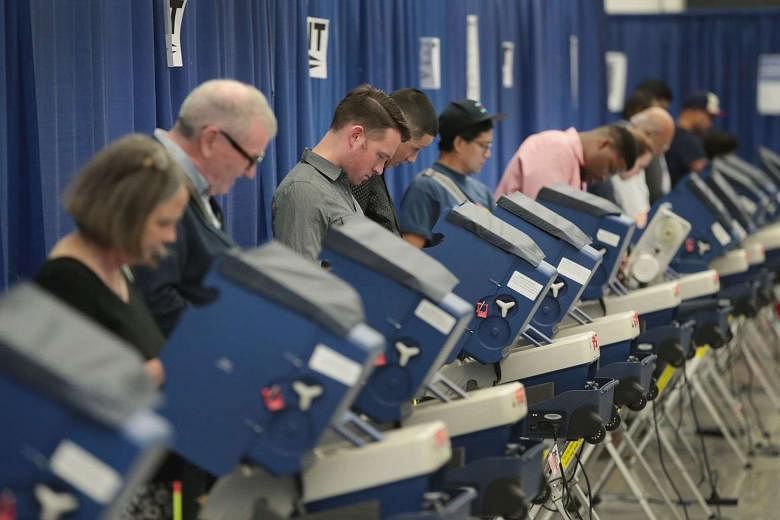CHICAGO (AFP) - More than 22 million people have already cast their ballots in the US presidential elections, and trends in early voting are offering some hints of the outcome less than a week before Election Day.
There is both good news and bad news in the numbers for Democratic nominee Hillary Clinton as she battles Republican nominee Donald Trump in a tightening final dash for the White House.
Early voting tallies indicate Democrats are turning out in greater numbers in some states than Republicans, an advantage for Clinton, experts say. But turnout is lagging among young people and African Americans, key constituencies that lifted a triumphant Barack Obama into the White House in 2008.
In Chicago, the popular president's adopted hometown and the country's third largest city, there is little sign of the enthusiasm deficit that polls are picking up nationally.
Early voting here is on pace to match or exceed 2012, when the country's first black president was re-elected to a second term, and officials say polling places fill up around midday with voters on their lunch break.
"It's very important to me to carry on what Obama started," said Democrat Deborah Land, 61, outside an early
voting location in downtown Chicago.
To the extent that it drives Democrats to the polls, that sentiment should help Clinton who has cast herself as Obama's loyal heir and guardian of his legacy.
Clinton was Obama's bitter rival for the Democratic nomination in 2008, but she served as his secretary of state and is now aiming to make history as the first female president of the United States.
But both Clinton and Trump are deeply unpopular, with unusually low favourability ratings - 44 per cent for Clinton and 38 per cent for Trump, according to an average of multiple polls by RealClearPolitics.
And after one of the meanest US presidential contests in memory, many voters are motivated less by their own candidate, than by their opposition to the other.
Mark Baker, a Clinton voter, said he felt compelled this year "because of the nature of the election, and frankly, Mr Trump."
"It's been a long election season," said the 57-year-old.
"I think everybody is eager for it to be over with, except Saturday Night Live" - the hit comedy show.
Meanwhile, the surprise revelation last week that the FBI was once again looking into Clinton's emails has injected renewed uncertainty into the race. A new Washington Post-ABC tracking poll showed Trump ahead of Clinton 46 to 45 per cent - the first time he has been ahead in that poll since May.
More significantly, the poll found the number of Clinton supporters who were enthusiastic about her candidacy dropped from 51 to 43 per cent, while Trump's numbers remained unchanged at 53 per cent. Michael McDonald of the University of Florida, who maintains a national tally of early voting, said it is unlikely that early voters will be swayed.
"People have consumed a lot of information about the candidates, and they've made up their minds, and they're going out and voting," McDonald said.
So far, there are signs of enthusiasm among early voters who are Latino, women and white liberals. "The worrisome signs for (Clinton's) campaign are the lower early voting rates for blacks and young people. They were essential pieces of the coalition that elected and re-elected Obama," said Barry Burden, professor of political science at the University of Wisconsin-Madison.
Trump faces bigger hurdles.
In the swing states of Nevada, Virginia and Colorado, Clinton has an early vote lead, according to McDonald.
"That's almost like checkmate, because Trump would have to win almost every other battleground state," he said. Also, Latino voters overwhelmingly support Clinton, and a record 27.3 million of them are eligible to vote in this election - four million more than during the last presidential race, according to the Pew Research Center.
"Compared to 2012, it appears that early voting is being used more by Latinos," Burden said, "This might reflect the efforts that the Clinton campaign has made into the Latino community and concerns among Latinos about what Trump has said about immigrants."
Meanwhile, Trump has to defend his position in reliably Republican states. For example, Texas is seeing outsize enthusiasm from early voters. More than a quarter of all eligible voters in the state had cast their ballots a week before the Nov 8 election - shattering records.
Early voting there is even more intriguing given recent poll numbers showing Clinton closing in on Trump's lead in the state - leading to speculation about whether deeply red Texas might turn blue.
"The fact that the state is perceived to be competitive... is driving both parties to the polls," said Brandon Rottinghaus, a political science professor at the University of Houston. It is unlikely that Clinton will win Texas, he said, but she could lose by a much smaller margin than past Democrats.
"That will be a success for them," he said, because it could help Democrats in future elections.

